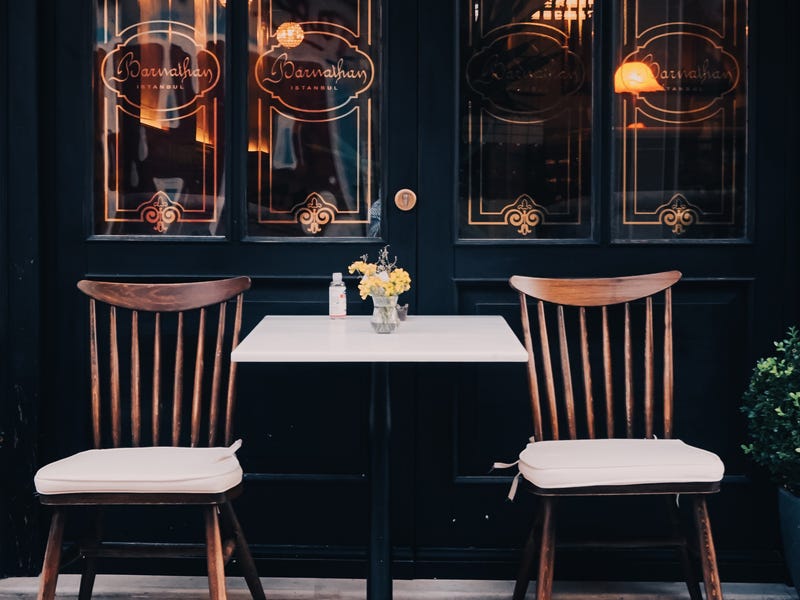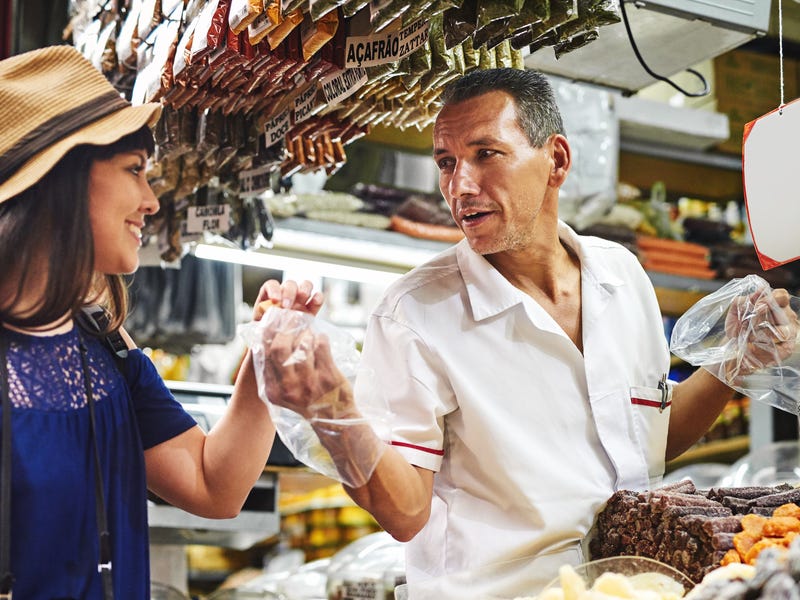
How to order a coffee in Spanish: 11 types, and 20 variations
Author: Marco Monroy
For some of us, coffee is more than a beverage–it’s a true necessity. If this sounds like you, then you need not waste any more time before learning how to order coffee in Spanish.
Even if you’re not studying Spanish, you should probably still learn a few ways to order coffee in different languages. That way, you can easily get your caffeine fix no matter where in the world life takes you.
And if you’re unlike most and don’t need coffee to function, you may still enjoy an occasional cappuccino or pumpkin spice latte. If you’re traveling to any of the coffee regions in Latin America, you’d be doing yourself a disservice by not trying some of the wonderful local coffees. Indeed, with no less than half of the world’s top 10 coffee producers, Latin American coffee is like no other.
So, you can already imagine that coffee is naturally a big part of Latin American culture. If you make new friends in Colombia, it’s not uncommon for them to invite you over “por un tintico.” If you’re not familiar with some of the coffee slang, you might end up passing up on a great opportunity for a fantastic conversation.
Luckily, this article will show you everything you need to know about coffee, from ordering your favorite coffee to coffee slang to the coffee regions in Colombia and Latin America. We’ll even show you how to place your favorite complicated Starbucks order in Spanish!
So, go ahead and make yourself a cup of coffee, sit back, and read on!

How to say coffee in Spanish
If you’ve studied the colors in Spanish, then you already know how to say coffee in Spanish: café. Yep, just like the color brown, coffee in Spanish is just café. Simple, right?
Since the singular already ends in -e, all you have to do to make it plural is add an -s: cafés. Couldn’t be easier!
And café is a masculine noun, so if you want to order a coffee, you just have to ask for un café. But we’ll get into more of that down below!
Types of coffee you can order in Spanish
Unless all you drink is black coffee, you’ll need to know a few more words than just un café. Sometimes, a macchiato or perhaps an iced coffee is what we need to hit the spot. No matter your taste preferences, the table below will help you learn how to order coffee in Spanish
| English | Spanish | IPA | Pronunciation |
| Coffee | Un café | kaˈfe | kah-feh |
| Iced coffee | Un café helado | kaˈfe eˈlaðo | kah-feh eh-la-doe |
| Black coffee | Un café negro | kaˈfe ˈneɣɾo | kah-feh neh-gro |
| A cup of coffee | Una taza de café | ˈtasa ðe kaˈfe | tah-za deh kah-feh |
| Decaf coffee | Un café descafeinado | kaˈfe ðeskafejˈnaðo | kah-feh des-kah-feh-e-na-doe |
| Latte | Un latte | ˈlatte | la-teh |
| Cappuccino | Un cappuccino | kappukˈsino | kah-poo-chee-no |
| Flat white | Un flat white | ˈflat ˈwite | flat white |
| A shot of espresso | Un shot de espresso | ˈsot ðe esˈpɾesso | shot deh ehs-preh-so |
| A double espresso | Un espresso doble | esˈpɾesso ˈðoβle | ehs-preh-so doh-bleh |
| A macchiato | Un macchiato | makˈʧjato | mah-key-ah-toe |
More notable coffee vocab
As mentioned earlier, coffee is a big part of most Hispanic cultures. So, even if you’re not a coffee drinker yourself, you’ll probably hear many words and phrases related to coffee in Spanish. And who knows, if you spend enough time in a coffee region in Colombia, you might end up becoming an avid coffee drinker yourself!

| English | Spanish | IPA | Pronunciation |
| Do you want coffee? | ¿Quieres café? | ˈkjeɾes kaˈfe | key-air-ehs kah-feh |
| Coffee break | Un descanso para tomar café | un desˈkanso ˈpaɾa toˈmaɾ kaˈfe | oon des-cahn-so pah-ra toe-mar kah-feh |
| I need coffee! | ¡Necesito un café! | neseˈsito wn kaˈfe | neh-seh-see-toe oon kah-feh |
| Can I have more coffee, please? | ¿Me podrías servir más café, por favor? | me poˈðɾias seɾˈβiɾ ˈmas kaˈfe | poɾ faˈβoɾ | meh poh-dree-as ser-ver mas kah-feh pore fah-vore |
| A coffee for here | Un café para tomar aquí | kaˈfe ˈpaɾa toˈmaɾ aˈki | oon kah-feh pah-ra toe-mar ah-key |
| A coffee to go | Un café para llevar | kaˈfe ˈpaɾa ʝeˈβaɾ | oon kah-feh pah-ra yeh-var |
| A coffee mug | Una taza de café | ˈtasa ðe kaˈfe | oo-nah tah-za deh kah-feh |
| A paper cup | Un vaso de cartón | ˈbaso ðe kaɾˈton | oon vah-so deh car-ton |
| A reusable cup | Un vaso reutilizable | ˈbaso rewtiliˈsaβle | oon vah-so reh-oo-tee-lee-sah-bleh |
| A straw | Un popote / Una paja | poˈpote / ˈpaxa | po-po-teh / pah-hah |
| A lid | Una tapa | ˈtapa | tah-pah |
| A sleeve | Una manga | ˈmanɡa | man-gah |
| A coffee stirrer | Un agitador de café | axitaˈðoɾ ðe kaˈfe | ah-he-tah-door deh kah-feh |
Coffee slang in Spanish
If you’ve spent some time in a Spanish-speaking community, you know that day-to-day conversations seldom sound anything like the dialogues in your textbooks. Spanish slang is ubiquitous all over Spain and Latin America, so you’d be spending your time wisely by learning a few words of coffee slang in Spanish.
| English | Spanish | IPA | Pronunciation | Description |
| A red | Un tinto | ˈtinto | teen-toe | Black coffee |
| A marshmallow | Un bombón | bomˈbon | bom-bon | Half espresso half condensed milk |
| A cut | Un cortado | koɾˈtaðo | core-tah-doe | Espresso with steamed milk |
| A damn | Un carajillo | kaɾaˈxiʝo | kah-rah-he-yo | Iced espresso with Licor 43 |
| A stained milk | Leche manchada | ˈleʧe manˈʧaða | leh-che man-cha-da | Warm milk with a touch of coffee |
How to order coffee in Spanish
Now, the time you’ve all been waiting for: how to actually order coffee in Spanish. Nowadays, there are a million different ways to order a coffee: with syrup, with foam, with a caramel swirl, with an extra shot, with milk, with soy milk, with oat milk, with no milk–you name it! The possibilities are endless.
Regardless, we’ve included some of the most popular ways to order coffee in Spanish in the table below. While this may not encompass the entire range and versatility of this wonderful java drink, it’s certainly a start.

| English | Spanish | IPA | Pronunciation |
| Black | Negro | ˈneɣɾo | neh-goh |
| With milk | Con leche | kon ˈleʧe | con leh-che |
| With almond milk | Con leche de almendras | kon ˈleʧe ðe alˈmendɾas | con leh-che deh al-men-drass |
| With soy milk | Con leche de soya | kon ˈleʧe ðe ˈsoʝa | con leh-che deh so-ya |
| With oat milk | Con leche de avena | kon ˈleʧe ðe aˈβena | con le-che deh ah-veh-na |
| Without milk | Sin leche | sin ˈleʧe | seen leh-che |
| With sugar | Con azúcar | kon aˈsukaɾ | con ah-zoo-car |
| With milk and sugar | Con leche y azúcar | kon ˈleʧe j aˈsukaɾ | con leh-che e ah-zoo-car |
| With an extra shot | Con un shot de espresso adicional | kon un ˈsot ðe esˈpɾesso aðisjoˈnal | con oon shot deh ehs-preh-so ah-dee-see-oh-nal |
| Decaf | Descafeinado | deskafejˈnaðo | des-cah-feh-e-nah-doe |
| Iced | Helado | eˈlaðo | eh-la-doe |
| Frappé | Frapeado | fɾapeˈaðo | frah-peh-ah-doe |
| On the rocks | En las rocas | en laz ˈrokas | ehn las ro-cass |
| With foam | Con espuma | kon esˈpuma | con ehs-poo-ma |
| With cinnamon | Con canela | kon kaˈnela | con cah-neh-la |
| With simple syrup | Con jarabe natural | kon xaˈɾaβe natuˈɾal | con hah-rah-beh nah-too-ral |
| With vanilla syrup | Con jarabe de vainilla | kon xaˈɾaβe ðe βajˈniʝa | con hah-rah-beh deh vah-e-nee-ya |
| With caramel syrup | Con jarabe de caramelo | kon xaˈɾaβe ðe kaɾaˈmelo | con hah-rah-beh deh ca-ra-meh-lo |
| With a caramel swirl | Con espiral de caramelo | kon espiˈɾal de kaɾaˈmelo | con ehs-pee-ral deh cah-rah-meh-lo |
| With whipped cream | Con crema batida | kon ˈkɾema βaˈtiða | con creh-ma bah-tee-dah |
Coffee order example sentences
If you feel like you need a little more guidance on how to place your very first coffee order in Spanish, we’ve got you covered. If you find this section helpful, you may also want to check out our blog on how to order food in Spanish.
| English | Spanish | IPA | Pronunciation |
| Hello, I would like a black coffee, please. | Hola, quisiera un café negro, por favor. | ˈola | kiˈsjeɾa wn kaˈfe ˈneɣɾo | poɾ faˈβoɾ | oh-la, key-see-air-ah oon cah-feh neh-gro, pore fah-vore |
| May I order a cappuccino with sugar, please? | ¿Te puedo pedir un capuccino con azúcar, por favor? | te ˈpweðo peˈðiɾ un kapukˈsino kon aˈsukaɾ | poɾ faˈβoɾ | teh poo-eh-doe peh-deer oon cah-poo-chee-no con ah-zoo-car, pore fah-vore |
| I would like an iced macchiato with a caramel swirl and whipped cream, please. | Quiero un macchiato helado con espiral de caramelo y crema batida, por favor. | ˈkjeɾo wm makˈʧjato eˈlaðo kon espiˈɾal de kaɾaˈmelo j ˈkɾema βaˈtiða | poɾ faˈβoɾ | key-air-oh oon mah-key-ah-toe eh-la-doe con ehs-pee-ral deh cah-rah-meh-lo e creh-mah bah-tee-da, pore fah-vore |
| Do you serve frappés? | ¿Tienes frapés? | ˈtjenes fɾaˈpes | tee-eh-nes frah-pehs |
| An iced americano on the rocks with vanilla syrup, please. | Un americano en las rocas con jarabe de vainilla, por favor. | un ameɾiˈkano en laz ˈrokas kon xaˈɾaβe ðe βajˈniʝa | poɾ faˈβoɾ | oon ah-meh-ree-cah-noe ehn las ro-cas con hah-rah-beh deh vah-e-nee-ya, pore fah-vore |
| A decaf iced latte, please. | Un latte helado descafeinado, por favor. | un ˈlatte eˈlaðo ðeskafejˈnaðo | poɾ faˈβoɾ | oon lah-teh eh-la-doe des-cah-feh-e-na-doe, pore fah-vore |
Coffee regions in Colombia
As you probably already know, Colombia is a coffee powerhouse. As the world’s third-largest producer of coffee beans, you can bet that coffee is a big deal in Colombia.
Whether you want to visit or simply want to make a more informed decision when you buy your next bag of coffee beans, you’ll want to be familiar with the coffee regions in Colombia.
An overwhelming majority of the coffee production is centered within the eje cafetero, also known as the “coffee triangle.” This region encompasses the following departments:
- Caldas
- Risaralda
- Quindío
- Tolima
- Antioquia
- Valle del Cauca
So, if your coffee comes from any of the places above, you’ll almost certainly guaranteed a phenomenal cup.

What’s the best place to visit in Colombia for coffee?
Any of the departments (Colombia’s equivalent of states) in the coffee triangle are the best places to visit for coffee. If you’re looking to plan a trip that is exclusively centered around coffee, then you’ll surely want to visit the town of Salento in Quindío.
If you want a more touristy destination with plenty of things to do while still having a strong coffee scene, then you’ll want to visit Medellín. Though Medellín itself isn’t technically in the coffee triangle, its department–Antioquia–is. This means that you’ll be able to make a short trip into the heart of the coffee triangle to find the best beans in Colombia while still enjoying some of the best of one of Colombia’s most popular destinations.
Are there coffee fields in Bogota?
Although Bogota isn’t located in the coffee triangle, there are some spectacular coffee fields nearby. So, if you’re only visiting Bogota for work or can’t otherwise travel directly to the coffee triangle, rest assured that you’ll be able to visit a coffee field that is worth your while.
Coffee regions in other Spanish-speaking countries
Beyond Colombia, though, there are many other coffee powerhouses in Latin America. As mentioned in the introduction of this article, half of the world’s ten largest producers of coffee beans are located in Latin America.
Here is some more information about the coffee regions in other Spanish-speaking countries:
- Mexico. Mexico is the 9th largest coffee producer in the world. Almost half of all coffee beans in Mexico are produced in the southern state of Chiapas, with the Eastern state of Veracruz a close second. Together, they produce about ⅔ of all of Mexico’s coffee.
- Guatemala. While not in the top ten of coffee exporters, Guatemala is still an important coffee producer. And coffee is extremely important to Guatemala’s economy, as it’s the second-largest export of the country, standing at 8.2% of all exports.
- Nicaragua. Like Guatemala, Nicaragua’s economy consists–in large part–of coffee exports. Just under 10% of Nicaragua’s exports are coffee beans, so if you visit Nicaragua, make sure to bring some fresh beans home!
- Honduras. Honduras is a relatively small country, and yet is the 6th-largest coffee exporter in the world. Honduras specializes in producing Arabica coffee beans, which are generally considered superior to Robusta beans.
- Peru. Peru is the 10th largest coffee bean exporter and–fittingly–has 10 coffee regions. The coffee beans from each region have their own flavor profiles, giving you a wide variety of Peruvian coffees to taste. Fancy a flight of coffee, anyone?
Make yourself a cuppa and keep it going
Sometimes, the best thing you can do is just make yourself a nice cup of coffee and focus on the task ahead. If you’re learning Spanish, we salute you! You’re doing a wonderful job so far, and we don’t blame you for wanting to figure out how to get yourself a cup of coffee in Spanish as soon as possible.
While you’re at it, why not treat a new friend to a cup of coffee? After all, making friends is one of the fastest ways to become fluent in Spanish. It’s a win-win situation: you make new friends, and you learn Spanish!
For more awesome study tips and helpful vocabulary guides like this one, make sure to check out our Spanish blog. We publish new guides all the time, helping you push your Spanish knowledge juuust a bit further. And all of our guides are always free, so make sure to bookmark this page!


